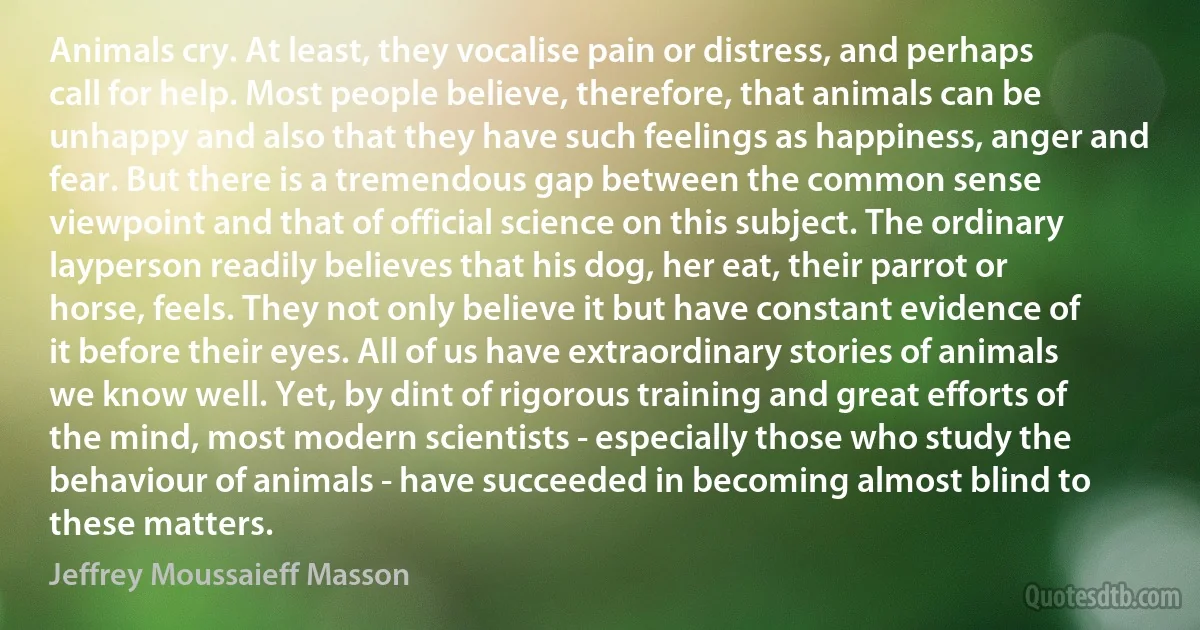
Animals cry. At least, they vocalise pain or distress, and perhaps call for help. Most people believe, therefore, that animals can be unhappy and also that they have such feelings as happiness, anger and fear. But there is a tremendous gap between the common sense viewpoint and that of official science on this subject. The ordinary layperson readily believes that his dog, her eat, their parrot or horse, feels. They not only believe it but have constant evidence of it before their eyes. All of us have extraordinary stories of animals we know well. Yet, by dint of rigorous training and great efforts of the mind, most modern scientists - especially those who study the behaviour of animals - have succeeded in becoming almost blind to these matters.
Jeffrey Moussaieff MassonRelated topics
almost anger becoming believe blind call common constant cry distress dog eat fear great happiness help horse least mind pain people perhaps science sense study unhappy well yet viewpoint feels eyesRelated quotes
As for myself, if I could have removed my doubts by so simple a step as that of becoming an atheist, I should have done it, no matter what scandal or punishment had followed. I studied the subject thoroughly, and found that for one doubt removed, another was raised, only to reach at last a result more inconceivable than that reached by the church, and infinitely more hopeless besides. What do you gain by getting rid of one incomprehensible only to put a greater one in its place, and throw away your only hope besides? The atheists offer no sort of bargain for one's soul. Their scheme is all loss and no gain. At last both they and I come back to a confession of ignorance; the only difference between us is that my ignorance is joined with a faith and hope.

Henry Adams
There is an influence which is getting strong and stronger day by day, which shows itself more and more in all departments of human activity, and influence most fruitful and beneficial-the influence of the artist. It was a happy day for the mass of humanity when the artist felt the desire of becoming a physician, an electrician, an engineer or mechanician or-whatnot-a mathematician or a financier; for it was he who wrought all these wonders and grandeur we are witnessing. It was he who abolished that small, pedantic, narrow-grooved school teaching which made of an aspiring student a galley-slave, and he who allowed freedom in the choice of subject of study according to one's pleasure and inclination, and so facilitated development.

Nikola Tesla
I never heard [my parents] talk between themselves about Palestine or Zionism, and I suspected they had no strong convictions on the subject, at least until after the war, when the horror of the Holocaust made them feel there should be a "National Home.” I felt they were bullied by the organizers of these meetings, and by the gangsterlike evangelists who would pound at the front door and demand large sums for yeshivas or "schools in Israel.” My parents, clearheaded and independent in most other ways, seemed to become soft and helpless in the face of these demands, perhaps driven by a sense of obligation or anxiety. My own feelings [...] were passionately negative: I came to hate Zionism and evangelism and politicking of every sort, which I regarded as noisy and intrusive and bullying.

Oliver Sacks
Great works of literature have frequently been produced by authors writing under assumed names. Despite readers' curiosity and the public's interest in identifying the creator of a work of art, an author generally is free to decide whether or not to disclose her true identity. The decision in favor of anonymity may be motivated by fear of economic or official retaliation, by concern about social ostracism, or merely by a desire to preserve as much of one's privacy as possible. Whatever the motivation may be, at least in the field of literary endeavor, the interest in having anonymous works enter the marketplace of ideas unquestionably outweighs any public interest in requiring disclosure as a condition of entry.

John Paul Stevens
Thus far woman has struggled through life with bandaged eyes, accepting the dogma of her weakness and inability to take care of herself not only physically but intellectually. She has held out a trembling hand and received gratefully the proffered aid. She has foregone her right to study, to know the laws and purposes of government to which she is subject. But there is now awakened in her a consciousness that she is defrauded of her legitimate Rights and that she never can fulfill her mission until she is placed in that position to which she feels herself called by the divinity within. Hitherto she has surrendered her person and her individuality to man, but she can no longer do this and not feel that she is outraging her nature and her God.

Sarah Grimké
